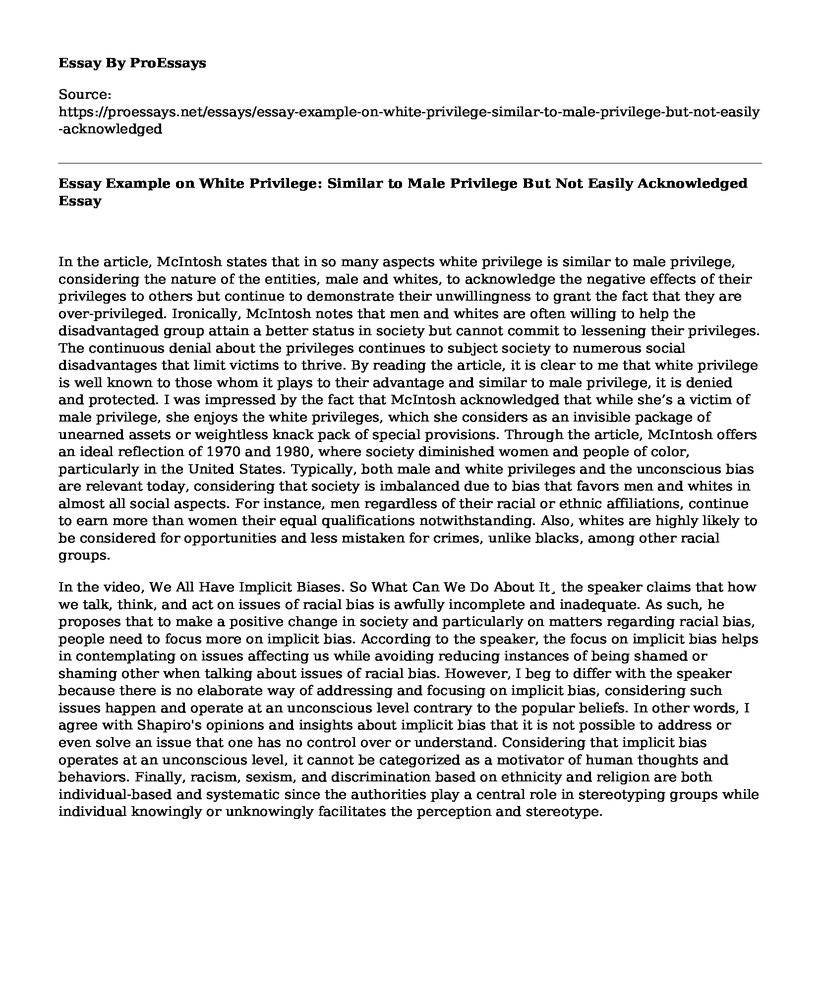In the article, McIntosh states that in so many aspects white privilege is similar to male privilege, considering the nature of the entities, male and whites, to acknowledge the negative effects of their privileges to others but continue to demonstrate their unwillingness to grant the fact that they are over-privileged. Ironically, McIntosh notes that men and whites are often willing to help the disadvantaged group attain a better status in society but cannot commit to lessening their privileges. The continuous denial about the privileges continues to subject society to numerous social disadvantages that limit victims to thrive. By reading the article, it is clear to me that white privilege is well known to those whom it plays to their advantage and similar to male privilege, it is denied and protected. I was impressed by the fact that McIntosh acknowledged that while she’s a victim of male privilege, she enjoys the white privileges, which she considers as an invisible package of unearned assets or weightless knack pack of special provisions. Through the article, McIntosh offers an ideal reflection of 1970 and 1980, where society diminished women and people of color, particularly in the United States. Typically, both male and white privileges and the unconscious bias are relevant today, considering that society is imbalanced due to bias that favors men and whites in almost all social aspects. For instance, men regardless of their racial or ethnic affiliations, continue to earn more than women their equal qualifications notwithstanding. Also, whites are highly likely to be considered for opportunities and less mistaken for crimes, unlike blacks, among other racial groups.
In the video, We All Have Implicit Biases. So What Can We Do About It¸ the speaker claims that how we talk, think, and act on issues of racial bias is awfully incomplete and inadequate. As such, he proposes that to make a positive change in society and particularly on matters regarding racial bias, people need to focus more on implicit bias. According to the speaker, the focus on implicit bias helps in contemplating on issues affecting us while avoiding reducing instances of being shamed or shaming other when talking about issues of racial bias. However, I beg to differ with the speaker because there is no elaborate way of addressing and focusing on implicit bias, considering such issues happen and operate at an unconscious level contrary to the popular beliefs. In other words, I agree with Shapiro's opinions and insights about implicit bias that it is not possible to address or even solve an issue that one has no control over or understand. Considering that implicit bias operates at an unconscious level, it cannot be categorized as a motivator of human thoughts and behaviors. Finally, racism, sexism, and discrimination based on ethnicity and religion are both individual-based and systematic since the authorities play a central role in stereotyping groups while individual knowingly or unknowingly facilitates the perception and stereotype.
Cite this page
Essay Example on White Privilege: Similar to Male Privilege But Not Easily Acknowledged. (2023, Aug 29). Retrieved from https://proessays.net/essays/essay-example-on-white-privilege-similar-to-male-privilege-but-not-easily-acknowledged
If you are the original author of this essay and no longer wish to have it published on the ProEssays website, please click below to request its removal:
- Gender in the Workplace Essay
- Essay Sample on Conventional or Unconventional Hazard Type
- Violence Against Women in Middle East Countries Essay Example
- Drug Abuse, Racial Injustice & The War on Drugs - Research Paper
- Overcoming Stigma: How to End Discrimination Against LGBT and Disabled People - Research Paper
- Essay Example on Addiction: The Automatic Behavior of Alcohol & Drug Abuse
- Paper Example on Feminism: From Its Roots to Present Day Gender Equity







